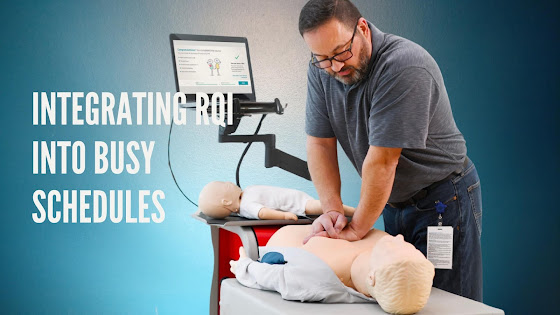Maximizing Certification Efficiency with the
RQI/Heart Code Course
In today’s fast-paced healthcare environment, continuous skill improvement and efficient certification processes are more important than ever. The Resuscitation Quality Improvement (RQI) and Heart Code courses offer a modern solution that not only enhances your skills but also saves time and reduces costs. Let’s explore the numerous benefits of these innovative training programs and how they can make a significant difference in your professional development.
Benefits of the RQI/Heart Code Course
The RQI/Heart Code courses are designed with flexibility and effectiveness in mind. Unlike traditional classroom settings, these programs allow you to complete much of your training online at your own pace, which is particularly beneficial for busy healthcare professionals. Here’s what sets them apart:
24/7 Accessibility: Whether you’re an early riser or a night owl, the RQI/Heart Code courses are available around the clock. This flexibility means you can fit training into your schedule rather than having to rearrange your life around a fixed class time.
Real-Time Feedback: One of the standout features of the RQI/Heart Code platform is the real-time feedback you receive while performing your skills. This feedback is detailed and immediate, allowing you to make necessary adjustments on the spot and ensuring that you are practicing high-quality resuscitation techniques.
Convenient Locations: For hands-on skills testing, you can visit our facilities in Madera or Fresno, where you can access the training sites 24 hours a day. This convenience makes it easy to complete the practical portion of your certification whenever it suits you best.
Effectiveness in Skill Improvement
The RQI/Heart Code programs are not just about convenience—they are designed to enhance the quality of your resuscitation skills. The courses incorporate American Heart Association guidelines, ensuring that you’re learning the most up-to-date and effective techniques.
By providing instant, detailed feedback, these courses help you pinpoint areas that need improvement. You can repeatedly practice these skills, gaining mastery over time, which is a significant advantage over traditional, one-time classroom sessions. The RQI program also measures crucial metrics like chest compression fraction (CCF), a critical factor in increasing the chances of survival during cardiac arrest.
Time Management and Flexibility
Time is a precious resource, especially for healthcare professionals who are often juggling multiple responsibilities. The RQI/Heart Code courses are structured to respect your time. You can complete the online portion at your own pace, breaking it into segments that fit into your busy schedule.
Furthermore, because the courses are available online, you eliminate the need for travel time to a physical classroom, which can be a significant time saver. The hands-on portion, which is still required for certification, can be completed at one of our 24-hour facilities whenever it’s convenient for you, adding an extra layer of flexibility.
Cost Savings
The financial benefits of the RQI/Heart Code courses are also worth noting. Traditional in-person courses often come with additional costs such as travel, time off work, and the potential need for childcare. By taking advantage of the RQI/Heart Code’s online and flexible scheduling options, you can significantly reduce these expenses.
Moreover, the courses are designed to help you retain your certification without the need for frequent renewals, which can further cut down on costs over time. The investment you make in these programs is not only cost-effective but also provides a higher return in terms of skill retention and professional competence.
Conclusion
The RQI/Heart Code courses offer a superior alternative to traditional certification methods by combining flexibility, real-time feedback, and cost savings with an emphasis on improving resuscitation skills. Whether you’re a healthcare professional looking to maintain your certification or someone new to the field, these courses provide a comprehensive and efficient path to success.
Ready to take the next step in your professional development? Visit our website or contact us today to learn more about how the RQI/Heart Code courses can benefit you. Our team is here to support you every step of the way, ensuring you get the most out of your training experience.
Resources
Resuscitation Quality Improvement: Improving Clinicians’ Performance
This study, published in AACN Advanced Critical Care, highlights the effectiveness of the RQI program in improving CPR performance among clinicians. The research demonstrates that frequent practice using the RQI platform, which provides real-time audiovisual feedback, significantly enhances the quality of chest compressions, a critical factor in improving patient outcomes during cardiac arrestThe Impact of Resuscitation Quality Improvement
This article from Learning RQI discusses how the RQI program has revolutionized CPR training by shifting from a traditional, infrequent training model to one that emphasizes continuous quality improvement through regular, low-dose, high-frequency practice. This approach has been shown to improve both educational outcomes and survival rates after cardiac arrest(Research + Evidence Behind Resuscitation Quality Improvement
This resource offers a comprehensive overview of the evidence supporting the RQI program. It includes studies that validate the program's effectiveness in improving resuscitation skills retention and patient survival outcomes. The focus on continuous quality improvement helps ensure that healthcare providers maintain high standards in life-saving techniques(

